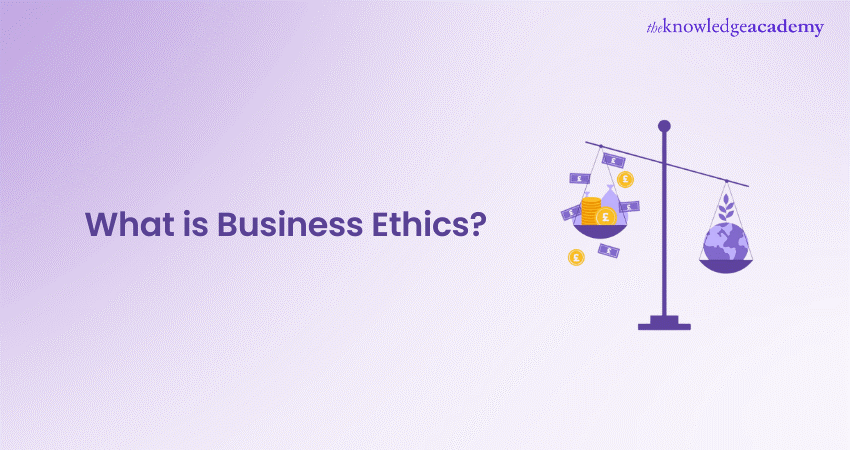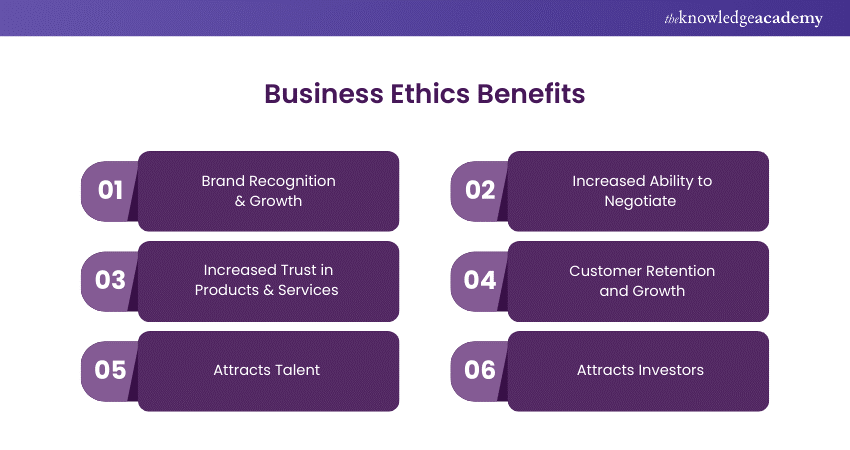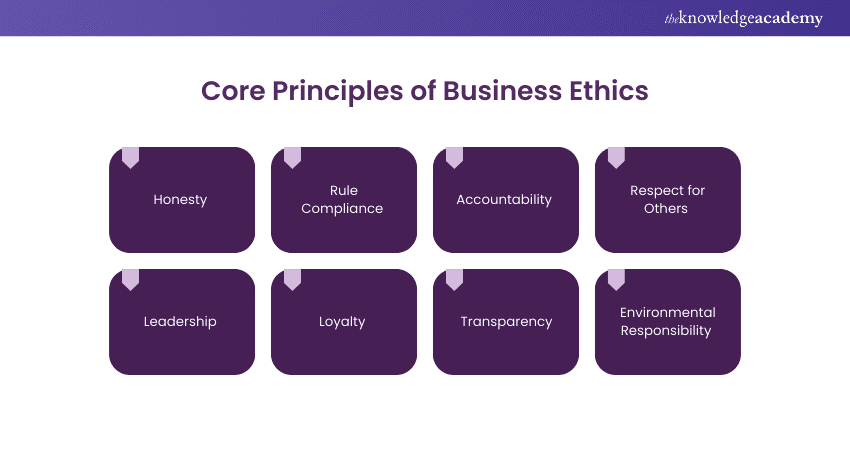We may not have the course you’re looking for. If you enquire or give us a call on +971 8000311193 and speak to our training experts, we may still be able to help with your training requirements.
We ensure quality, budget-alignment, and timely delivery by our expert instructors.

Running a business is an experience that is as challenging as it is rewarding. Of all the parameters used to measure business success, business ethics ranks as among the most important. After all, a business is about more than just selling and buying. At its heart, is a human element that is concerned with the emotions and mindsets of customers and employees alike.
Basically, business ethics are policies that guide the behaviour of corporate entities regarding arguably controversial subjects. This concept emerged as corporations became aware of a rising consumer-based society that expressed concerns for social causes, environment and corporate responsibility.
If you work in a business setting, this blog will help you understand business ethics and why they matter in shaping the success of your organisation.
Table of Contents
1) What is Business Ethics?
2) Importance of Business Ethics
3) Core Principles of Business Ethics
4) Types of Business Ethics
5) Examples of business ethics
6) Conclusion
What is Business Ethics?
Business ethics comprises of the moral principles, policies and values that govern the way organisations and individuals engage in business activity.
Business ethics go beyond legal requirements to lay down a code of conduct that drives employee behaviour at all levels. Consequently, this helps build trust between a business and its customers.
Issues such as insider trading, discrimination, bribery, fiduciary responsibilities and social responsibilities often come up in a discussion on ethics. The law ideally sets the tone for business ethics, providing a basic guideline that businesses can adopt to follow and to gain public approval.
Importance of Business Ethics

Business ethics is important because they ensure that organisations comply with all applicable laws. This helps them maintain their reputation among peers and customers while shielding them from legal liability.
Additionally, adhering to ethical standards helps attract quality team members. Businesses that treat their employees well will appeal to job seekers providing significant employee benefits. Ethical treatment can also enhance employee retention and reduce hiring and training costs.
Furthermore, a business that treats its clients and customers ethically can build trust and long-term relationships. Satisfied customers are more likely to return and may recommend the business to others.
Want to set new benchmarks for your business ethics goals? Sign up for our Ethics in Workplace Training!
Here's a summary of the benefits of business ethics:
a) Brand recognition and growth
b) Increased ability to negotiate
c) Increased trust in products and services
d) Customer retention and growth
e) Attracts talent
f) Attracts investors
Core Principles of Business Ethics

When navigating through a business setting, it’s important to remember the core principles that constitute business ethics
1) Honesty
It’s important that everyone in the staff is dedicated towards speaking the truth. intentionally making false assertions, misrepresentations, exaggerations or selective omissions should be avoided in a business setting. Bad news and good news should be received and communicated with equal sincerity.
2) Rule Compliance
Organisations can develop more specialised policies starting at the macro level and then using these industry rules as a framework. They must enforce these principles in addition to writing a code of ethics.
Additionally, companies should consider adding scenarios that team members can discuss in regular training on the company’s procedures.
3) Accountability
Ethical employees understand and take personal accountability for their actions towards their coworkers, businesses and communities. Accountability ensures a complete dedication to the ethics of all acts, decisions and relations.
4) Respect for Others
Showing respect means a commitment to the human rights, freedom, dignity, interests and privacy of every staff member. An ethical employee recognises that everyone deserves the right to express their opinions and thoughts without fear of judgment or discrimination.
Executives who uphold business ethics treat everyone with respect and dignity, regardless of ethnicity, gender, age or national origin.
5) Leadership
The sign of good leadership is a commitment to ethical decision-making. Organisations and business executives should strive to set a good example by supporting the development of a culture that values ethical decision-making and moral reasoning.
6) Loyalty
Loyalty is a valuable trait for team leaders and corporate leaders. It's essential for team members to remain loyal to their managers, coworkers and the company.
This could involve speaking positively about the business in public and addressing corporate or personal issues privately. Customer and client loyalty is crucial for maintaining good business relations and attracting new business by cultivating a positive reputation.
7) Transparency
Organisations should commit to transparency by making corporate policies and information accessible to the relevant parties. For example, transparency involves salaries, disclosing the standards for pricing increases, hiring, dealing with violations at work, issuing promotions and terminating personnel.
8) Environmental Responsibility
Environmental responsibility means that an organisation recognises its impact outside of the marketplace. Business owners, staff members and customers must continue to focus on the global climate situation.
Making decisions that reduce negative influence on the environment is part of ethical business practices. Examples include:
a) Lowering carbon emissions
b) Reducing the amount of garbage produced
c) Promoting energy-saving measures
Types of Business Ethics
Let’s explore the various kinds of business ethics that need to be prioritised:
1) Technology Ethics
Technology ethics include risk management and individual rights. These are rules that can be applied to technology. With the adoption of e-commerce procedures, customer privacy, ethical use of intellectual property and personal information protection are part of technology ethics.
2) Personal Responsibility
Every employee will be required to demonstrate personal responsibility at both the executive and entry level. This involves completing tasks specially assigned by your manager or fulfilling the basic duties outlined in your job description. When employees make mistakes, they need to accept responsibility and take the necessary steps to correct it. Demonstrating these traits is among the qualities of a good employee.
3) Fairness
It goes without saying that people have personal biases. But preferences and personal convictions shouldn’t be allowed to impact decisions in the workplace.
Favouritism is an ethical violation, and the company must guarantee that everyone gets equal opportunity for advancement.
4) Corporate Social Responsibility (CSR)
Corporate social responsibility (CSR) requires that organisations act responsibly. CSR Benefits an organisation be socially accountable to itself, its stakeholders and the community where it operates.
Environmental protection, fundraising on behalf of social causes and Improving labour policies are a few examples of CSR.
Examples of Business Ethics
Businesses express their ethics in many ways. Consider these examples:
1) Workplace Diversity
A business can express fairness by placing high importance on workplace diversity. Building a diverse workplace involves using recruiting practices that provide equal opportunity to people from different gender, ethnic and social groups.
Even though it adds time and effort to the hiring process, it's a worthwhile step. By employing a diverse range of people, the business gains the benefit of different perspectives. It demonstrates the company’s focus on equality.
2) Whistleblower Protection
As a business grows, it becomes difficult to verify if employees are adhering to the company’s ethical standards. The business often has to rely on whistleblowers (a person who informs authority figures about suspicious activity) to learn about unethical practices within the company.
To encourage employees to report unethical practices, companies must ensure protections against negative consequences. With these protections put in place, employees won't fear facing disciplinary action or losing their jobs for being a whistleblower.
3) Data Privacy
Businesses often collect information about their customers. The information can range from an email address and physical address to health and financial information, depending on the nature of the business.
Companies that collect customer data promise to secure the information and not share it without the customer's permission. Business ethics protect employees' personnel records, ensuring that access is granted only to those with a valid need to know.
4) Customer Focus
One way a business displays respect for its customers is by prioritising their needs. For example, if a customer finds the services or goods to be unsatisfactory, the business does whatever is necessary to provide compensation.
In case of a faulty product, the business may offer a replacement or a refund. If the customer complained about poor service, the company should apologise and offer a discount or some other form of compensation.
5) Environmental Stewardship
Many companies take environmental concerns seriously, be it reducing waste or cleaning land, air and local water bodies. Businesses act on this in various ways, such as reducing air travel and employing teleconferencing technology as much as possible. They might also promote recycling in their offices by providing receptacles to collect recyclable waste.
6) Fair Employee Compensation
Companies that comply with principles of respect and fairness strive to pay their team members a fair wage for the work they do. This fair wage is decided based on the employees’ experience, education and job duties.
Additionally, the companies regularly review compensation and make adjustments to ensure it continues to reflect the positions and experiences of employees.
Businesses reward outstanding employee performances with bonuses which are good incentives for team members to work hard and continue with the company. These bonuses are also a way for the business to express gratitude for the employees’ efforts.
7) Organisational Transparency
A business that practices transparency is clear and honest in its communication with employees and customers alike. This means that the communication ensures there's no confusion about the policies and priorities that guide business decisions.
8) Community Engagement
Companies feel an ethical obligation to offer a helping hand to the communities in which they operate. This can take the form of employee volunteer programs such as serving in a soup kitchen, cleaning up after a natural disaster, helping with home repairs, or teaching at the local community centre. These programs not only help those in need but also help build trust and respect within the community.
Conclusion
Knowing What is Business Ethics is beneficial to not only employees and customers, but also society, environment, stakeholders and shareholders. A business’ ethical practices not only boost revenues and profits but also fosters a positive work environment, thus building trust with consumers and business partners.
Great business ethics can set your company apart from the competition. Learn how to accomplish it through our Management Ethics Course!
Frequently Asked Questions

Ethics in business performs the role of guiding employee behaviour at all levels and helps build trust between a business and its customers.

Workplace Diversity, data privacy, fair employee compensation, community engagement and environmental protection are examples of business ethics.

Ethics is a system of moral principles that influence how people handle decision-making and lead their lives. Ethics is concerned with what is good and beneficial for society.

The Knowledge Academy takes global learning to new heights, offering over 30,000 online courses across 490+ locations in 220 countries. This expansive reach ensures accessibility and convenience for learners worldwide.
Alongside our diverse Online Course Catalogue, encompassing 17 major categories, we go the extra mile by providing a plethora of free educational Online Resources like News updates, Blogs, videos, webinars, and interview questions. Tailoring learning experiences further, professionals can maximise value with customisable Course Bundles of TKA.

The Knowledge Academy’s Knowledge Pass, a prepaid voucher, adds another layer of flexibility, allowing course bookings over a 12-month period. Join us on a journey where education knows no bounds.

The Knowledge Academy offers various HR Courses, including Diversity Training, Recruitment Training and Business Ethics training. These courses cater to different skill levels, providing comprehensive insights into Business Skills.
Our HR Training Blogs cover a range of topics related to Human resources, offering valuable resources, best practices, and industry insights. If you looking to advance your HR management skills, The Knowledge Academy's diverse courses and informative blogs have got you covered.
Upcoming HR Resources – Learn about Human Resources Batches & Dates
Date
 Ethics in Workplace Training
Ethics in Workplace Training
Fri 17th Jan 2025
Fri 21st Mar 2025
Fri 16th May 2025
Fri 18th Jul 2025
Fri 19th Sep 2025
Fri 21st Nov 2025







 Top Rated Course
Top Rated Course



 If you wish to make any changes to your course, please
If you wish to make any changes to your course, please


